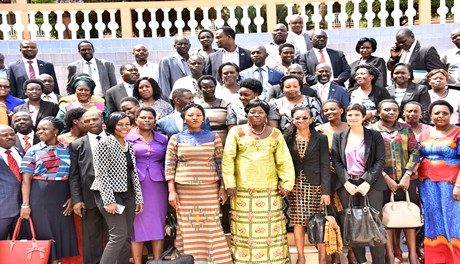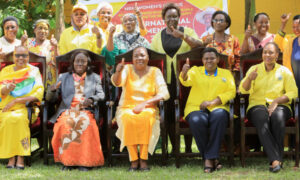
Ugandan women have no opportunity to report cases of discrimination to the United Nations since the country has not acceded to the additional Protocol on the Convention on the Elimination of All Forms of Discrimination against Women (CEDAW).
The additional Protocol, which came into effect in 1999, gives individuals and groups of women the right to complain to the Committee on the Elimination of Discrimination against Women about violations of the CEDAW.
The Rt. Hon. Speaker of Parliament, Rebecca Kadaga, said that Uganda, a signatory to the CEDAW, is required to carry out certain activities intended to eliminate discrimination against women, including in the political and public life of the country; and legislation, to suppress all forms of traffic in women and exploitation of prostitution of women.
“Ugandans have no channel to complain to the UN because the government has not acceded to the Optional Protocol to the CEDAW,” said Kadaga.
Kadaga was speaking at the opening of a two day National Parliamentarians Seminar on the CEDAW held at Hotel Africana in Kampala, today Wednesday 14th June 2017.
She also said that Uganda had failed in its obligations to report about its implementation of CEDAW since 2010; and neither had the Minister of Gender made any reports to Parliament.
“At the end of this Seminar, we should demand that government accedes to the Optional Protocol and also demand that the Reports are availed,” she said.
“In the UN system, parliaments are not partners but mere spectators. The Committee (on the Elimination of Discrimination against Women) should be stricter and demand that countries show that their reports have been tabled and discussed by national parliaments,” she added.
The Speaker also proposed that Parliament amends the Rules of Procedure to provide for government reporting on actions taken on the elimination of discrimination against women.
Kadaga also blamed government for not tabling various laws intended to implement court orders delivered to prevent discrimination against women; including in the Divorce Act, which set higher requirements for women than men while suing for divorce.
“Let us see how to improve in areas of discrimination and ensure that the next generation is free from discrimination,” she said.
A member of the UN Committee on the Elimination of Discrimination against Women, Hilary Gbedemah, said that although laws against discrimination against women are in place, the practice is different in those countries.
“For society to develop, we must have equal opportunities for everyone. We need to have measures in place for women to be able to compete with men,” she said.
She added that parliaments were central in the implementation of CEDAW since several orders given by the Committee on the Elimination of Discrimination against Women, require amending existing laws or complying with international standards.
The Convention on the Elimination of All Forms of Discrimination against Women was adopted by the United Nations General Assembly on 18th December 1979. States parties are expected to submit a national report to the Committee on the Elimination of All Forms of Discrimination against Women, indicating the measures adopted to give effect to the provisions of the Convention at least every four years.




























